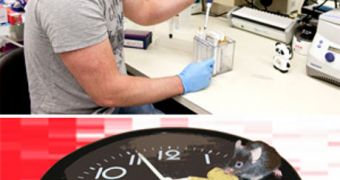Scientists at the La Jolla, California-based Salk Institute for Biological Studies announce that the results of a new study on unsuspecting lab mice seems to suggest that the timing of eating may be just as important as the content of the actual food. In a groundbreaking, new discovery, the scientists have found that it's not the circadian rhythm that controls the daily activities of genes inside our livers, but in fact the food intake itself. This is a major find, as it sheds a whole-new light on how diet experts and doctors need to approach the food recommendations they give to their patients.
“If feeding time determines the activity of a large number of genes completely independent of the circadian clock, when you eat and fast each day will have a huge impact on your metabolism,” Salk Regulatory Biology Laboratory Assistant Professor Satchidananda Panda, who is also the leader of the new study, says. “We believe that it is not shift work per se that wreaks havoc with the body's metabolism but changing shifts and weekends, when workers switch back to a regular day-night cycle,” the expert further explains. Details of the amazing work will appear in the upcoming issue of the respected scientific journal Proceedings of the National Academy of Sciences (PNAS), the Institute reports.
The liver is arguably one of the most important organs in the human body, and is considered vital because its failure leads to death. It is, in essence, the body's metabolic clearinghouse, cleaning various chemicals from the foods and drinks that we ingest, and ensuring that nothing harmful is absorbed. Its daily activities are controlled by thousands of genes, which constantly turn on and off, depending on whether there is something to be done or not. The recent investigation basically showed that these activities were not triggered by the passing of the day/night cycle (the circadian rhythm), but by the times we usually left between meals.
“The liver oscillator in particular helps the organism to adapt to a daily pattern of food availability by temporally tuning the activity of thousands of genes regulating metabolism and physiology. This regulation is very important, since the absence of a robust circadian clock predisposes the organism to various metabolic dysfunctions and diseases,” Panda adds. He explains that graduate student and study first author Christopher Vollmers proved this by placing mice that could keep time, and mice that had this ability removed, into a strict feeding and fasting time schedule, with very precise hours.
“Food-induced transcription functions like a metabolic sand timer that runs for 24 hours and is continually reset by the feeding schedule while the central circadian clock is driven by self-sustaining rhythms that help us anticipate food, based on our usual eating schedule. But in the real world we don't eat at the same time every day and it makes perfect sense to increase the activity of metabolic genes when you need them the most,” Vollmers shares.
The Salk Institute for Biological Studies is one of the world's preeminent basic research institutions, where internationally renowned faculties probe fundamental life-science questions in a unique, collaborative, and creative environment. Focused both on discovery and on mentoring future generations of researchers, Salk scientists make groundbreaking contributions to our understanding of cancer, aging, Alzheimer's, diabetes, and cardiovascular disorders by studying neuroscience, genetics, cell and plant biology, and related disciplines.

 14 DAY TRIAL //
14 DAY TRIAL //